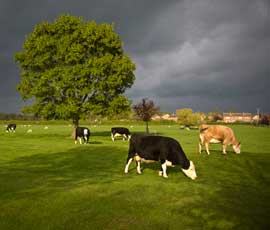Feeding grass ‘most sustainable’ way to rear beef

Feeding cattle on grass throughout their life cycle is the most environmentally-sustainable way to rear beef, according to new research for the National Trust.
Livestock produce high levels of methane as part of the process of digesting grass, which has led to calls that intensive production methods – where cattle are fed largely on cereals, producing less methane – should be preferred over more traditional grass-fed livestock farming.
But a new study by Best Foot Forward and farm business consultants Laurence Gould Partnership highlights the benefits of grass-fed beef – both in people and the environment.
Research at 10 National Trust farms shows that while the carbon footprint of grass-fed and conventional farms were comparable, the carbon sequestration contribution of well-managed grass pasture on the less intensive systems reduced net emissions by up to 94%, even resulting in a carbon “net gain” in upland areas.
The farms that had recently converted to organic status showed even greater gains, the research showed.
“The results are contrary to recent thinking that livestock farming methods must intensify further in order to lessen carbon emissions to feed an ever-increasing world population,” said Rob Macklin, national agriculture and food adviser at the National Trust.
Currently, one of the biggest global challenges is how to increase food security while reducing the environmental impact of food production.
The debate about climate change and food often calls for a reduction of meat consumption and a more plant-based diet.
But Mr Macklin said that such calls often overlooked the fact that many types of grassland are unsuitable for continuous arable cropping.
“Grasslands support a range of ecosystems services, including water resources, biodiversity and carbon capture and storage,” he added. “Grazing livestock not only contributes to their maintenance but also turns grass into human-edible food.”
Mr Macklin said other recent research has found the health benefits of beef and lamb are greater when animals are fed totally on grass – their natural food.
Omega 3 fatty acids – recognised as essential to good physical and mental health – are higher in meat from grass and the levels of saturated fat are one-third of grain-fed beef.
Policy-makers across Europe and in the UK are currently tackling ways to introduce carbon-efficient food production. Therefore, the research is “timely”, said Patrick Begg, rural enterprises director at the National Trust.
“This research demonstrates how extensive grass-fed beef should be at the heart of discussions,” he added.
Discussions around reforms to the Common Agricultural Policy should also take note of this research, said Mr Begg.
“As the reform drives towards even stronger ‘greening’ of the payments farmers receive, we think management that delivers quality, grass-fed beef should be encouraged even more through agri-environment measures.
“We’ll be taking the findings forward with our tenants, policy makers and the industry to explore how we can develop a market advantage which supports a stronger grass-fed beef sector”.
